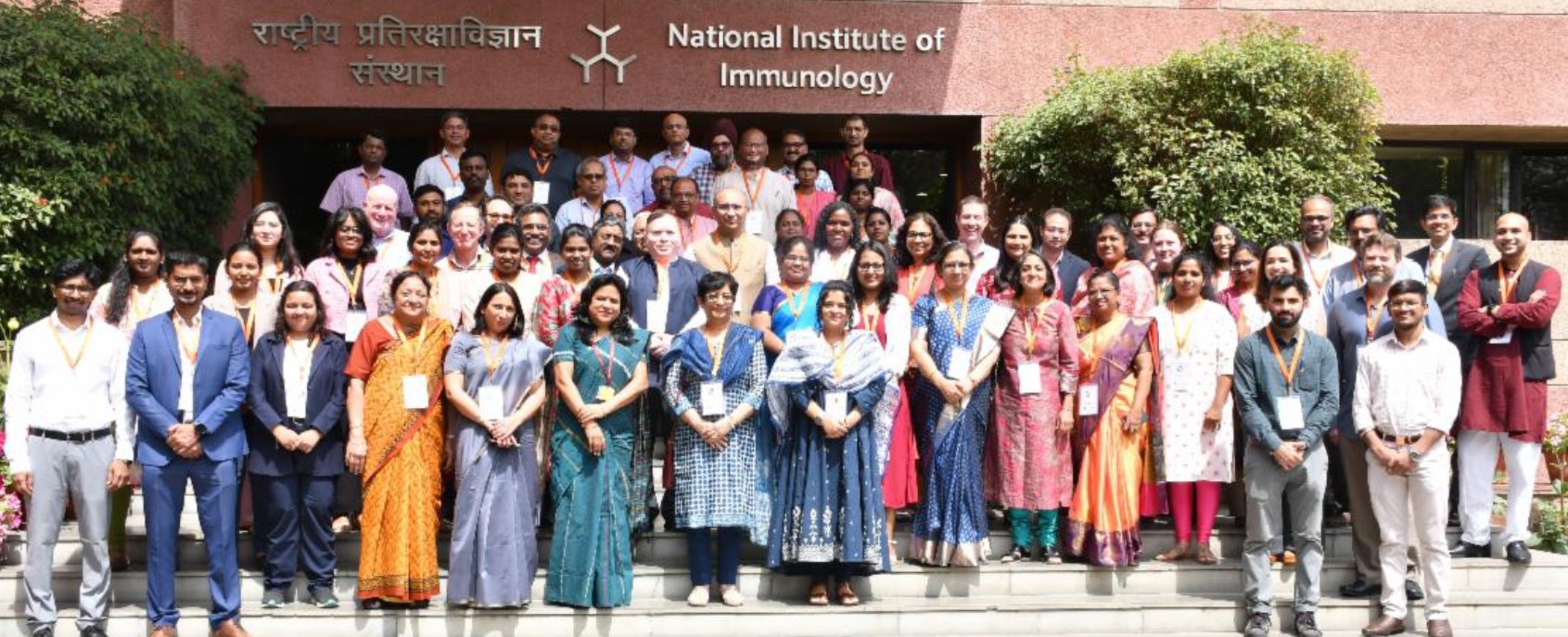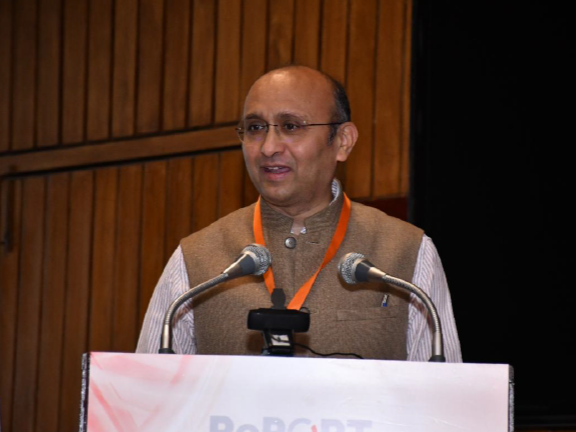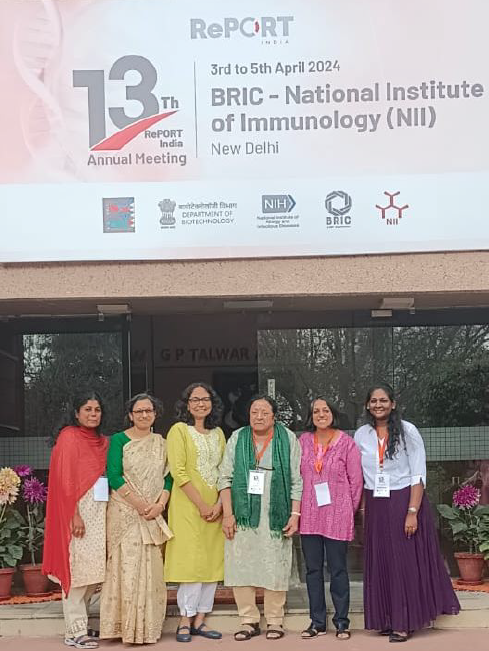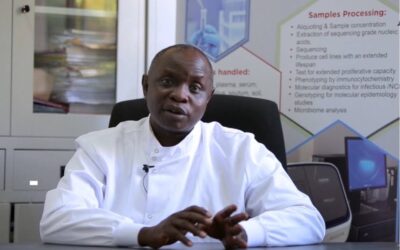Fostering Collaborative Research and Innovation in TB
The 13th RePORT India Annual Meeting held from 3-5 April 2024, at the National Institute of Immunology (NII) in New Delhi.
The 13th RePORT India Annual Meeting was held from 3-5 April 2024, at the National Institute of Immunology (NII) in New Delhi.
Delegates from the 13th RePORT India Annual Meeting
Organized under the auspices of the Department of Biotechnology (DBT), Government of India, and the National Institute of Allergy and Infectious Diseases (NIAID), USA, the event was graced by esteemed dignitaries, including Dr. Rajesh S. Gokhale, Secretary DBT, and Dr. Fatima Jones from the NIAID.
Established in 2013 as part of the Indo-US Vaccine Action Program (VAP), RePORT India is one of earliest RePORT International networks with a decadelong history in tuberculosis (TB) research. In Phase II, RePORT India is at the forefront under the leadership of Dr. Amita Gupta (US Chair), Dr. Sonali Sarkar (India Chair), Dr. Vijaya Valluri (India Co-Chair) and Dr. Padmini Salgame (US Co-Chair). Dr. Gokhale’s keynote address highlighted the consortium’s growth,
development, and evolution over the years, appreciating the significant work accomplished by RePORT India
Dr. Rajesh Gokhale, Secretary, DBT India at the 13th RePORT India Annual Meeting
The emphasis this year was more on the impact of nutrition on TB, lung health in persons with TB, and the quality of life post-TB treatment. Researchers presented findings on genomic surveillance, biomarkers, drug resistance, and new diagnostic tools. The consortium explored challenges in diagnosing TB, particularly in children and primary care settings, and aimed to develop low-cost, easily accessible point-of-care diagnostic tools. Additionally, the team deliberated on testing strategies for culture confirmation, the role of the private sector in improving access to affordable healthcare technologies, and future strategies for identifying biomarkers to predict unfavorable treatment outcomes. The overarching effects of undernutrition on TB and potential research areas for action were thoroughly analyzed. Dr. Akshay Gupte, from Boston University, reported from previous analyses,
Nearly half of persons with TB had impaired lung function, with airflow obstruction and restrictive spirometry patterns observed in a quarter and 30% of patients, respectively. We aim to elucidate the immunological pathways associated with acute lung injury and explore potential modulation strategies for future clinical trials.
The consortium emphasized the need for improved TB detection tools, such as non-sputum-based tests, digital X-rays, and AI-enabled technologies. The report highlighted the challenges of balancing affordability, high performance, and suitability for decentralized settings when selecting new diagnostic methods. Furthermore, results from biomarker studies aimed at predicting the progression from latent TB infection to active disease and identifying immunodeficiencies in children leading to latent TB reactivation or active TB progression were discussed.
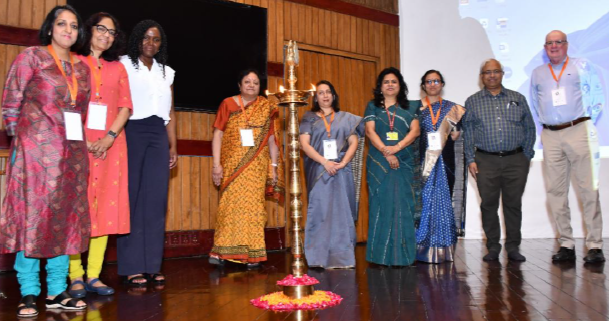
Opening Ceremony with leadership and hosts
Insights on drug level monitoring, population pharmacokinetic (PK) modeling, and the potential for pharmacogenomic evaluation to optimize drug dosing in the Indian population were explored. Challenges in diagnosing TB meningitis (TBM), potential biomarkers, as well as the pathogenesis and classification of TBM, were also discussed. Improving TB detection tools and access was also a pressing concern. As emphasized by Dr. Sanjay Sarin from FIND India,
There is a need for improved tools for TB detection and early diagnosis, particularly in children, and the need to improve access to WHO-approved molecular diagnostic tests.
RePORT India Phase I accumulated a total of 105,036 specimens, highlighting the extensive sample collection for comprehensive research analysis. The ongoing Phase II remains robust, with 100% of the adult pulmonary TB diagnostic cohort, 68% of Cohort A, and 46% of Cohort B successfully enrolled. Additionally, the sample availability is extensive (>70,443 aliquots), showcasing the substantial breadth and depth of the sample collection, enabling thorough and impactful research outcomes. Visit the Central Biorepository for more information.
This consortium aims to accelerate progress in TB research by pooling expertise and resources across multiple countries, fostering innovation, and translating research findings into impactful outcomes, contributing to the global effort towards TB elimination. The emphasis on operational and interventional research signifies a move towards implementing findings into real-world solutions to combat TB effectively in which RePORT India will be leading the way.
From left: Senbagavalli Prakash (Program Manager), Sonali Sarkar, (India Chair), Padmini Salgame (US Co-Chair), Vijaya Valluri (India Co-Chair), Amita Gupta (US Chair) and Nancy Divya (Administrative Coordinator)
What's new
Innovations in TB Healthcare
Innovations in TB HealthcareMoses Joloba: Dialogues on Academic Advancement, Laboratory Leadership, and Trailblazing Innovations in TB HealthcareMoses Joloba: Dialogues on Academic Advancement, Laboratory Leadership, and Trailblazing Innovations in TB HealthcareIn a...
Global Fight Against TB
Voices from the Global Fight Against TBReflections on World TB Day: Voices from the Global Fight Against TBReflections on World TB DayEach year, on March 24, we recognize World TB Day. This annual event commemorates the date in 1882 when Robert Koch announced his...
Ending TB
Ending TBEnding TB: The Critical Role of Determinants

